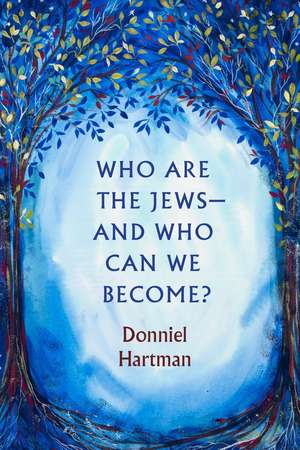Who Are the Jews—And Who Can We Become?
Autor Donniel Hartmanen Limba Engleză Paperback – 29 noi 2023
Who Are the Jews—And Who Can We Become? tackles perhaps the most urgent question facing the Jewish people today: Given unprecedented denominational tribalism, how can we Jews speak of ourselves in collective terms?
Crucially, the way each of us tells our “shared” story is putting our collective identity at risk, Donniel Hartman argues. We need a new story, built on Judaism’s foundations and poised to inspire a majority of Jews to listen, discuss, and retell it. This book is that story.
Since our beginnings, Hartman explains, the Jewish identity meta-narrative has been a living synthesis of two competing religious covenants: Genesis Judaism, which defines Jewishness in terms of who one is and the group to which one belongs, independent of what one does or believes; and Exodus Judaism, which grounds identity in terms of one’s relationship with an aspirational system of values, ideals, beliefs, commandments, and behaviors. When one narrative becomes too dominant, Jewish collective identity becomes distorted. Conversely, when Genesis and Exodus interplay, the sparks of a rich, compelling identity are found.
Hartman deftly applies this Genesis-Exodus meta-narrative as a roadmap to addressing contemporary challenges, including Diaspora Jewry’s eroding relationship with Israel, the “othering” of Israeli Palestinians, interfaith marriage, the Israeli-Palestinian conflict, and—collectively—who we Jews can become.
Preț: 163.72 lei
Nou
Puncte Express: 246
Preț estimativ în valută:
31.33€ • 32.79$ • 26.07£
31.33€ • 32.79$ • 26.07£
Carte disponibilă
Livrare economică 10-24 martie
Preluare comenzi: 021 569.72.76
Specificații
ISBN-13: 9780827615618
ISBN-10: 0827615612
Pagini: 360
Ilustrații: index
Dimensiuni: 152 x 229 x 24 mm
Greutate: 0.48 kg
Editura: The Jewish Publication Society
Colecția The Jewish Publication Society
Locul publicării:United States
ISBN-10: 0827615612
Pagini: 360
Ilustrații: index
Dimensiuni: 152 x 229 x 24 mm
Greutate: 0.48 kg
Editura: The Jewish Publication Society
Colecția The Jewish Publication Society
Locul publicării:United States
Notă biografică
Donniel Hartman is president of the Shalom Hartman Institute, where he holds the Kaufman Family Chair in Jewish Philosophy. He is the author of Putting God Second: How to Save Religion from Itself and The Boundaries of Judaism, among other books; the founder of religious education, training, and enrichment programs in Israel and North America; and host of the popular Jewish podcast For Heaven’s Sake.
Cuprins
Acknowledgements
Introduction
Part 1. What’s Our Story?
1. The Genesis Covenant and the First Jews
2. Exodus Judaism and the Covenant of Commandments
3. Conversion and the Rabbinic Synthesis of Genesis and Exodus
4. Good Jews and Bad Jews and the Art of Boundaries
5. Maimonides, Champion of Exodus
6. Emancipation from the Genesis Covenant
7. Zionism and the Resurrection of Genesis
8. The North American Homeland between Europe and Zion(ism)
Part 2. A Zionism for the Twenty-First Century
9. Foundations for a Twenty-First Century Liberal Jewish Story
10. Recalibrating the Religion-State Status Quo
11. Israel’s Relationship with World Jewry
12. Unpacking a Not-So-“Basic” Law
13. Yearning Again for Peace
Part 3. A Diaspora Future
14. At Home
15. Intermarriage and the Meaning of Jewishness
16. The Eroding North America-Israel Relationship
17. The Future of Liberal Zionism in North America
18. The Choice to Belong
Notes
Bibliography
Index
Introduction
Part 1. What’s Our Story?
1. The Genesis Covenant and the First Jews
2. Exodus Judaism and the Covenant of Commandments
3. Conversion and the Rabbinic Synthesis of Genesis and Exodus
4. Good Jews and Bad Jews and the Art of Boundaries
5. Maimonides, Champion of Exodus
6. Emancipation from the Genesis Covenant
7. Zionism and the Resurrection of Genesis
8. The North American Homeland between Europe and Zion(ism)
Part 2. A Zionism for the Twenty-First Century
9. Foundations for a Twenty-First Century Liberal Jewish Story
10. Recalibrating the Religion-State Status Quo
11. Israel’s Relationship with World Jewry
12. Unpacking a Not-So-“Basic” Law
13. Yearning Again for Peace
Part 3. A Diaspora Future
14. At Home
15. Intermarriage and the Meaning of Jewishness
16. The Eroding North America-Israel Relationship
17. The Future of Liberal Zionism in North America
18. The Choice to Belong
Notes
Bibliography
Index
Recenzii
"Hartman adroitly argues that 'as long as the story we tell ourselves about ourselves embraces and strengthens the complexity of our identities . . . we provide ourselves with the tools to expand our moral aperture,' and invites essential debates about Judaism's past, present, and future. This impresses."—Publishers Weekly
“This inspired work gives us a language for understanding today’s core Jewish issues, both in Israel and the Diaspora. I look forward to gathering my community around it for a spirited discussion of its insights.”—Rabbi Edward Feinstein, senior rabbi, Valley Beth Shalom, in Encino, California
“While not shying away from criticism or complexity, Hartman gives us a glimpse of the world as it could be: one steered by collective Jewish meaning, moral rigor, and courageous commitment to each other.”—Rabbi Angela Warnick Buchdahl, senior rabbi, Central Synagogue, in New York City
“In this groundbreaking book, Donniel Hartman takes on the great Jewish question of our time: who are we? Combining deep erudition with passion and love, Hartman explores the complexities of Jewish identity, writing with sympathy for the variety of ways in which we express our Jewishness even as he insists that we aspire to our highest values. Who Are the Jews—And Who Can We Become? belongs on the short shelf of indispensable books on contemporary Judaism.”—Yossi Klein Halevi, author of Letters to My Palestinian Neighbor
Descriere
Who Are the Jews—And Who Can We Become? tackles perhaps the most urgent question facing the Jewish people today: Given unprecedented denominational tribalism, how can we Jews speak of ourselves in collective terms?
